
Algebra and Logic
Scope & Guideline
Unlocking the Secrets of Numbers and Reasoning.
Introduction
Aims and Scopes
- Algebraic Structures and Their Properties:
The journal publishes research on various algebraic structures such as groups, rings, algebras, and lattices, exploring their intrinsic properties and interrelations. - Applications of Algebra in Logic:
Papers often investigate how algebraic principles can be applied to logical frameworks, enhancing the understanding of logical systems and their computational aspects. - Categorical and Model Theoretic Approaches:
Research focusing on categorical frameworks and model theory is prominent, emphasizing the structural aspects of algebraic systems and their representations. - Complexity in Algebra and Logic:
The journal addresses complexity issues related to algebraic structures and logical theories, including decidability, categoricity spectra, and computability. - Seminars and Collaborative Research:
The inclusion of seminar sessions indicates an emphasis on collaborative research and the dissemination of new ideas among the mathematical community.
Trending and Emerging
- Advanced Algebraic Computability:
An increasing number of papers are exploring the connections between algebra and computability, particularly in relation to complexity and decidability, which reflects the growing interest in algorithmic perspectives. - Non-Classical Logics and Their Algebraic Structures:
There is a noticeable trend towards the study of non-classical logics and their algebraic counterparts, highlighting the integration of diverse logical systems within algebraic frameworks. - Interdisciplinary Approaches:
Emerging themes often involve interdisciplinary research that combines algebra with other fields such as computer science, particularly in areas like multi-agent systems and temporal logics. - Geometric and Topological Aspects of Algebra:
Recent publications are increasingly addressing the geometric and topological properties of algebraic structures, opening new avenues for research that connects algebra with topology.
Declining or Waning
- Traditional Group Theory:
Research specifically centered on classical group theory, while still present, seems to be receiving less attention compared to more abstract algebraic structures and their applications. - Elementary Logic and Basic Proof Techniques:
Papers focusing on foundational aspects of logic and elementary proof techniques are less frequent, possibly indicating a shift towards more complex and applied logical frameworks. - Basic Algebraic Structures:
While foundational algebraic concepts are essential, there appears to be a waning interest in basic studies of simpler algebraic structures, with more emphasis on advanced and specialized topics.
Similar Journals
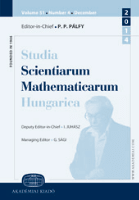
STUDIA SCIENTIARUM MATHEMATICARUM HUNGARICA
Connecting Ideas, Cultivating MathematicsSTUDIA SCIENTIARUM MATHEMATICARUM HUNGARICA is a distinguished journal published by AKADEMIAI KIADO ZRT, focusing on the vast field of mathematics, specifically categorized under general mathematics. With its ISSN 0081-6906 and E-ISSN 1588-2896, this journal has been a critical platform for mathematicians, researchers, and educators since its inception in 1996, continuously evolving through to 2024. Based in Hungary, it holds an impact factor that positions it in the 3rd quartile for mathematics in the 2023 rankings, reflecting its contribution to academic discourse within the discipline. Though not an open-access journal, STUDIA SCIENTIARUM MATHEMATICARUM HUNGARICA serves as an important repository of innovative research findings and methodologies, making it a vital resource for professionals and students striving to stay ahead in the rapidly advancing world of mathematics. The journal's commitment to quality and rigor enhances its relevance, evidenced by its Scopus rank in the 51st percentile overall in the general mathematics category.
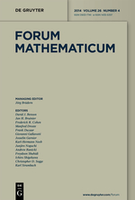
FORUM MATHEMATICUM
Connecting Ideas: A Hub for Mathematical ExcellenceFORUM MATHEMATICUM, published by WALTER DE GRUYTER GMBH, is a distinguished academic journal based in Germany, known for its significant contributions to the field of mathematics. With an ISSN of 0933-7741 and an E-ISSN of 1435-5337, the journal features comprehensive studies ranging from applied mathematics to diverse mathematical disciplines. Having maintained a commendable presence since 1989, FORUM MATHEMATICUM has achieved notable classification rankings, including Q2 in Applied Mathematics and Q1 in miscellaneous Mathematics as of 2023. Additionally, it holds a Scopus rank within the top 60th percentile in General Mathematics, making it a prominent platform for researchers and professionals seeking rigorous analysis and innovative methodologies in mathematics. While the journal does not currently offer open access, its rich content is pivotal for advancing mathematical theory and applications, appealing to students and seasoned academics alike.

CUBO-A Mathematical Journal
Advancing Knowledge Across Mathematical DisciplinesCUBO-A Mathematical Journal, published by the Department of Mathematics and Statistics at Universidad de La Frontera in Chile, stands as a significant Open Access resource in the field of mathematics since its inception in 2011. With an ISSN of 0716-7776 and an E-ISSN of 0719-0646, this journal invites submissions that explore a wide spectrum of mathematical disciplines, including Algebra, Number Theory, Analysis, Geometry, Topology, and Logic. Although currently positioned in the Q4 category across various mathematical domains and registered at Rank #223/399 in General Mathematics in Scopus, CUBO serves as a valuable platform for emerging researchers and practitioners to disseminate their findings. Operating under a continuous commitment to accessibility, CUBO fosters an inclusive academic environment that supports the exchange of innovative ideas vital to advancing mathematics. The journal's target audience encompasses a diverse community of researchers, professionals, and students eager to participate in the expanding dialogue within mathematical sciences.

BULLETIN OF THE BRAZILIAN MATHEMATICAL SOCIETY
Advancing Mathematical Frontiers with Every IssueBulletin of the Brazilian Mathematical Society is a distinguished journal published by Springer Heidelberg, aimed at advancing the field of mathematics through the dissemination of research findings and scholarly discourse. With an ISSN of 1678-7544 and an E-ISSN of 1678-7714, this journal is indexed within the Q2 quartile in the field of mathematics (miscellaneous), reflecting its impact and relevance in the academic community. The journal has been recognized for its commitment to quality, as evidenced by its Scopus ranking within the 58th percentile among general mathematics publications. Since its inception in 1996, the Bulletin has served as a vital platform for mathematicians to share innovative ideas, theoretical advancements, and practical applications, making it essential reading for researchers, professionals, and students alike. Open access options are available, ensuring that the latest research is accessible to a wide audience, thereby fostering collaboration and growth within the mathematics community.
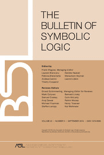
BULLETIN OF SYMBOLIC LOGIC
Cultivating Knowledge in Logic and PhilosophyBULLETIN OF SYMBOLIC LOGIC, published by Cambridge University Press, is a distinguished academic journal that serves as an essential platform for the dissemination of research in the realms of logic and philosophy. Since its inception in 1995, this journal has progressed through its convergence years and remains committed to fostering intellectual discourse among scholars. With a 2023 ranking in the Q1 category of Philosophy and a Q3 classification in Logic, it continues to uphold its reputation as a significant contributor to the field. While operating under a traditional subscription model, the journal dedicates itself to publishing high-quality articles that explore foundational issues, advanced theories, and innovative insights in symbolic logic. Researchers, professionals, and students will find invaluable resources within its pages, particularly as it ranks favorably among peers, with noteworthy standings in Scopus rankings. For those seeking to deepen their understanding of logical frameworks and their philosophical implications, BULLETIN OF SYMBOLIC LOGIC is an indispensable resource.

Forum of Mathematics Sigma
Empowering the mathematical community with impactful insights.Forum of Mathematics Sigma is a premier open access journal published by Cambridge University Press that has been at the forefront of mathematical research since its inception in 2013. With a strong emphasis on advancing the fields of mathematics, the journal consistently achieves Q1 rankings across multiple categories, including Algebra and Number Theory, Analysis, and Computational Mathematics. This distinction highlights its impact and relevance within the scholarly community. The journal prides itself on providing a platform for innovative research, fostering collaboration among researchers and practitioners across various mathematical disciplines. Open access publication ensures that cutting-edge findings are widely available to readers globally, enhancing the dissemination of knowledge. With an address in the heart of Cambridge, England, Forum of Mathematics Sigma is dedicated to promoting high-quality research and making significant contributions to the development of mathematics.
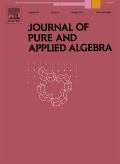
JOURNAL OF PURE AND APPLIED ALGEBRA
Connecting Theoretical Insights with Practical ApplicationsJOURNAL OF PURE AND APPLIED ALGEBRA, published by Elsevier, stands as a premier academic platform in the fields of algebra and number theory, boasting a distinguished impact factor that reflects its rigorous peer-review process and influential research contributions. Established in 1971 and continuing its impressive trajectory until 2025, this journal has carved a niche for itself by providing a forum for innovative studies, theoretical advancements, and practical applications within pure and applied algebra. With its prestigious Q1 ranking in Algebra and Number Theory, the journal not only ranks among the top tier in its category but also offers an extensive collection of research that caters to mathematicians, academicians, and students alike. Scholars will find it an invaluable resource for disseminating their findings, as well as keeping abreast of significant developments in the field, further solidifying its role as a cornerstone of mathematical research.
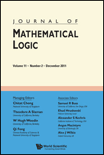
Journal of Mathematical Logic
Bridging Theory and Application in Logic StudiesJournal of Mathematical Logic, published by World Scientific Publishing Co Pte Ltd, stands as a premier platform for the dissemination of cutting-edge research in the field of logic, with a notable Q1 ranking in the category of Logic for 2023. Catering to an international audience of researchers, professionals, and students, this journal serves as a vital resource for the latest advancements and theoretical developments in mathematical logic. Spanning from 2007 to 2024, the journal emphasizes contributions that explore both foundational and applied aspects of logic, thereby appealing to a diverse readership. Although currently subscribed access only, the journal’s rigorous peer-review process ensures high-quality publications that enrich the academic discourse within the mathematical community. With its strategic location in Singapore, the Journal of Mathematical Logic not only contributes to the global conversation in mathematics but also fosters collaboration among scholars from various backgrounds.
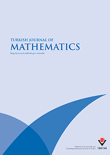
Turkish Journal of Mathematics
Uncovering the Essence of Mathematical InquiryTurkish Journal of Mathematics is a prestigious academic publication dedicated to the advancement of mathematical research across a variety of subfields. Established in 1995 and published by the Tubitak Scientific & Technological Research Council Turkey, this journal has built a solid reputation, especially noted for its significant contributions to the field over the years, with its convergence spanning from 1995 to 2002 and again from 2006 to 2024. The journal, which holds a commendable Q2 ranking in Mathematics (miscellaneous) and is positioned in the 66th percentile of Scopus rankings for General Mathematics, aims to disseminate high-quality original research, reviews, and innovative methodologies to advance both theoretical and applied mathematics. Researchers, professionals, and students alike will find invaluable resources within its pages, providing insights that are pivotal for academic and practical applications in mathematics. Although it does not currently offer open access options, the journal remains an essential platform for those looking to engage with the forefront of mathematical inquiry.

Reports on Mathematical Logic
Innovating Ideas at the Intersection of Logic and PhilosophyReports on Mathematical Logic is an esteemed academic journal published by Jagiellonian University’s Theoretical Computer Science Department in Poland. Focusing on the interdisciplinary realms of logic and philosophy, this journal publishes rigorous research articles that explore the foundational aspects and implications of mathematical logic in various contexts. Although it currently maintains an open access model, the journal's impact can be seen through its categorized rankings, with a Q4 in Logic and a commendable Q2 in Philosophy as of 2023. This positions it as a valuable resource for academics seeking to engage with innovative ideas and methodologies in the field. Additionally, the journal has a historical academic presence, having converged in its publication years from 2011 to 2014 and again from 2016 to 2023, underscoring its ongoing commitment to advancing knowledge in logic. With a focus on contemporary research, Reports on Mathematical Logic is essential for researchers, professionals, and students aiming to stay at the forefront of logic studies.